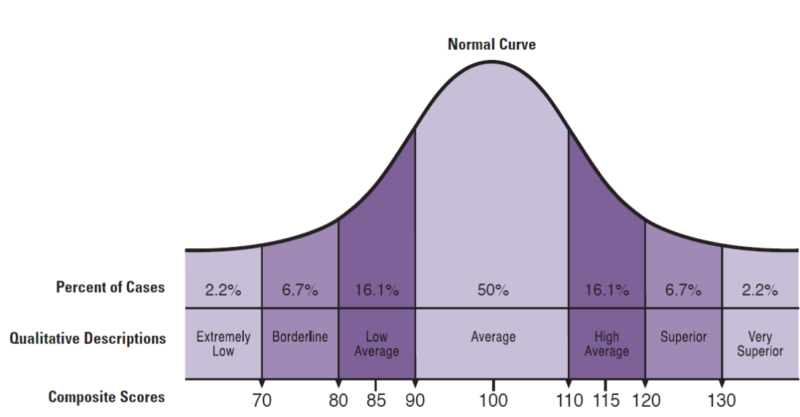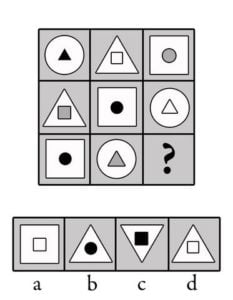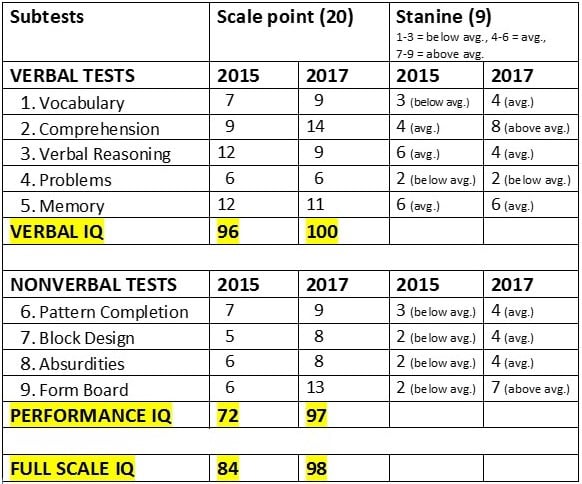
Intelligence Quotient (IQ) is a popular cultural term that measures human intelligence. However, many myths exist about what intelligence constitutes. For example, many believe people are born with a set IQ that will determine their trajectory toward success. Is this true, or can specific educational intervention methods increase human intelligence?
It is important to consider the consensus amongst psychologists on how intelligence is defined. In simple terms, intelligence is a person’s ability to solve problems, and there are two main types of intelligence:
- Verbal intelligence is the ability to analyze information and solve problems using language-based reasoning. Language-based reasoning may involve reading, listening to words, conversing, writing, or even thinking. From classroom learning to social communication to texting and email, our modern world is built around listening to or reading words for meaning and expressing knowledge through spoken language.
. - Nonverbal intelligence is the ability to analyze information and solve problems using visual or hands-on reasoning. In other words, it is the ability to make sense of and act on the world without necessarily using words.
.
Although IQ tests are the most popular tool for intelligence testing, it’s important to note that a psychologist should ideally administer these tests. So, let’s look a bit deeper than the popular cultural understanding of the IQ test.
IQ tests explained
A full-scale IQ score in the 90 to 110 range is considered average; a person with an IQ score in this range can be said to have average intelligence. Half of the population have an IQ between 90 and 110, while 25 percent have higher IQs and 25 percent have lower IQs.

In addition to looking at the full-scale score, one can also compare the following three individual scores:
- Verbal IQ measures acquired knowledge, verbal reasoning, and comprehension of verbal information. Below is a question that would require verbal reasoning ability:
.
Butcher is to knife as hairdresser is to
a.) scissors
b.) hair
c.) curls
d.) blond .
Answer: a
- Performance IQ (also called nonverbal IQ) measures a person’s nonverbal reasoning, spatial processing skills, attentiveness to detail, and visual-motor coordination skills. Below is a question that would require nonverbal reasoning ability:

Answer: d
- Full-scale IQ
.
What is expected is that the three scores will cluster close enough together to indicate that the individual’s verbal and performance skills are evenly developed. When there is a significant difference between verbal and performance scores, it may indicate a learning difficulty or impairment of some kind. For instance, a nonverbal learning difficulty (NVLD) is usually suspected when a child demonstrates a verbal IQ of 20 or more points higher than their performance IQ. Low-performance IQ, relative to verbal IQ, is also associated with reported hyperactivity in children.
Increasing performance IQ
Edublox specializes in multisensory educational interventions aimed at developing and automatizing the foundational skills of reading, spelling, and mathematics.
Dr. Wynand de Wet, today a veteran educational psychologist, did his practical research for a Master’s degree in Educational Psychology at a school for deaf students. The subject of his research project concerned the optimization of intelligence. The group exposed to the Edublox cognitive training program was tutored simultaneously for 27.5 hours between April and August and showed an increase of 11.625 points in performance IQ (deaf people can only be assessed on performance IQ). The group who did not receive cognitive training showed an increase of only 4.625.
Our own trials confirmed that Edublox increases IQ, especially performance IQ, in a short period. In one experiment, the IQs of ten youngsters with severe learning difficulties were tested before starting the program and again after receiving 40 hours of one-on-one instruction. Their ages ranged between 7 and 18. The average verbal IQ score increased from 85.4 to 91.0, the average performance IQ score from 92.6 to 105.1, and the average full-scale IQ from 87.0 to 97.1.
Long-term effects of increasing IQ

A wonderful Edublox success story regarding IQ increase is that of Mia*, a young girl who started at Edublox when she was in 4th grade. She was diagnosed as mildly dyslexic, performed poorly in all school subjects, and was on the verge of failing 4th grade. Mia’s case is noteworthy due to the significant discrepancy between her verbal IQ and performance IQ — a total of 24 points!
Before she started at Edublox in 2015, she was assessed by her school psychologist. Her verbal IQ was 96, which is average, while her performance IQ was a mere 72, which can be described as borderline intellectual functioning. Her full-scale IQ was 84 (low average).
Fast forward to November 2017. After attending Edublox for two years (approximately 240 hours), her IQ was reassessed by the same psychologist. Her verbal IQ was now 100, which is average, while her performance IQ has increased by 25 IQ points to 97! Her full-scale IQ was 98 (average).
.

.

Fast forward again to 2023. Six years after completing Edublox, Mia continues to blossom in school and ranks in the Top 20 at her school for academics — without receiving any accommodations along the way. Here she is, holding her trophy.
Although there are many myths around IQ, the Edublox team believes that cognitive training intervention can have a positive effect on a person’s ability to solve problems and their intelligence.
We encourage parents to keep abreast of new research in the field and to investigate educational interventions that may make a difference when they receive disappointing assessment results or IQ scores. Mia is a shining example of a student who changed her academic trajectory through hard work and the right help!
* Name has been changed
Edublox offers cognitive training and live online tutoring to students with dyslexia, dysgraphia, dyscalculia, and other learning disabilities. Our students are in the United States, Canada, Australia, and elsewhere. Book a free consultation to discuss your child’s learning needs.

